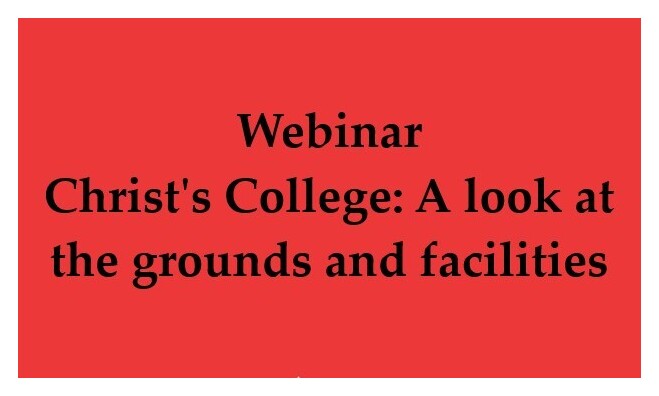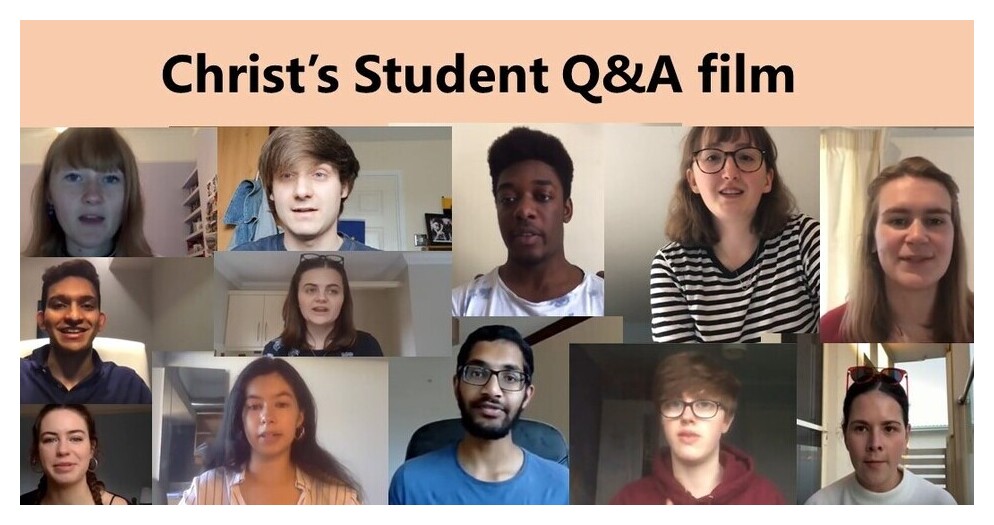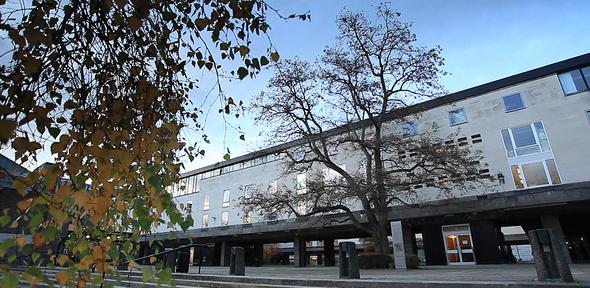
HISTORY TASTER SERIES - LADY MARGARET BEAUFORT
Weekly online taster sessions throughout March and optional opportunity to visit Christ's in April. For students:
- currently in Year 12 (Y13 Northern Ireland, S5 Scotland)
- studying History at A-Level, IB Higher Level, Scottish Higher or equivalent qualification
- attending a school or college that does not charge fees
Deadline 11th February - full details, dates, eligibility criteria and event page click here!
Why study History and Modern Languages at Christ’s?
Many prominent historians have flourished here, including J. H. Plumb (33rd Master of Christ’s), David Cannadine, Linda Colley, Quentin Skinner and Simon Schama. The College’s track record in Modern Languages is equally distinguished, indeed the Modern Humanities Research Association, which today plays a critical role in promoting the study of European languages and literature, internationally, was founded in a room in the College shortly after World War One. Our 36th master was Malcolm Bowie, the renowned specialist in modern French literature (Mallarmé and Proust in particular) who is commemorated by the student-run Malcolm Bowie Society for languages.
The College has a lively welcoming community which arranges parties and dinners including student-run inititiatives such as the MML Dinner. As well as the languages society, undergraduate historians from Christ’s can get together at the many events hosted by the Seeley Society. Our Old Library has a fascinating collection of early printed books and manuscripts to consult, and our first-years often take trips to explore museums and historical sites outside Cambridge.
The Christ's Awards include generous financial support with dissertation research or language-learning programmes at Cambridge University Language Centre and abroad.
Course structure and content
The joint degree in History and Modern Languages combines the best of both subjects. It offers the opportunity to develop near native-speaker skills in a foreign language while studying a range of papers relating to the culture and history of the relevant language area; options in some languages also include film and contemporary politics. Students will also develop analytical skills in History through studying topics in British, European, American and World history, as well as the history of political thought. There will be opportunities to work with historical sources in foreign languages.
The languages available for study are:
- French (post A Level)
- German (from scratch or post-A Level)
- Spanish (from scratch or post-A Level)
- Italian (from scratch or post-A Level)
- Portuguese (from scratch)
- Russian (from scratch or post-A Level)
The History and Modern Languages degree (or ‘tripos’) is a four-year degree. You spend third year studying or working abroad, immersed in the language, culture, history and politics of a foreign country. Please visit the University website for full details of the History and Modern Languages course content and structure.
Teaching
You have lectures at the Faculty of History and Faculty of Modern Languages, plus small-group teaching sessions known as ‘supervisions’ here in College. These are organised by your Director of Studies to provide personalised feedback on your work. And to support your studies, you have access to Cambridge’s world-class libraries and their extensive collections of foreign language films.
The Christ’s Director of Studies on this course is Dr Mary Franklin-Brown. At Christ's, you also have a Director of Studies in your specific language to give you strong specialised support.
Fellows and Directors of Studies include:
| Who | Language | Who | Language | Who | History Specialism |
|---|---|---|---|---|---|
| Giulia Boitani | Italian | Stephanie Rohner | Portuguese and Spanish | Felix Waldmann | 17th and 18th Century Intellectual History and the History of Political Thought |
| Robert Britten | German and Dutch | Emily Tomlinson | French | David Reynolds | 20th Century Britain and America |
| Cecil Courtney | French | Ksenia Zanon | Slavonic Studies | Harriet Lyon | Early Modern Britain |
| Mary Franklin-Brown | French | Jim Secord |
Social history of Science since 1750 |
Helen Pfeifer | Ottoman History |

What do our students think?
Read about the experiences of Eebbaa and Nik studying History and Modern Languages here at Christ's. You may also find it helpful to read profiles by students studying History (Alice, Max, Isobel, James and Sathya) and Modern and Medieval Languages (Juliette and Ethan). If you’d like to hear from other Christ's students, please watch the Christ's student Q&A film, and visit our Student Profiles page.
How to apply
Visit How to Apply for full details and a timeline of the application process. We welcome applicants from all backgrounds and school types, all over the world. If you're applying from outside the UK, please read our international students section.
Subject requirements
All applicants should be studying at A-Level, IB Higher Level or equivalent in the language for which they are applying (unless you will be studying a language from scratch), and A-Level, IB Higher Level or equivalent in History.
Applicants proposing to study a language from scratch must offer a modern or classical language at GCSE or equivalent.
Written work
After your application is received, you will be asked to send us two essays that you feel accurately reflect your abilities and interests. This should be work which has been prepared during the normal course of your studies and has already been marked by a teacher. One piece of work should be relevant to History, the other should be in the language for which you have applied (except for ab initio languages, in which case you should send an essay written in English). We recommend that you keep copies of the work you send for your own reference as it may be discussed at interview. Full written work guidelines will be provided as part of the current applicants section on this website (published by 20 September each year).
Interviews
If we invite you for interviews, these usually take place in early December. Those invited for Cambridge interviews are normally interviewed for 35-50 minutes in total. At Christ’s, we usually split the time into two interviews with academics in History and Modern Languages, one in each subject. Applicants should be prepared to discuss their relevant interests and potential directions they may wish to follow. Further, more general information about interviews (including two useful films) is available in the Cambridge interviews section. We also recommend this film in which current Cambridge History students discuss their interview experiences. Remember that your interviews may cover different things to the students speaking.
We also hold interviews in a number of locations overseas. If this may be relevant for you, please see the international students section .
At-interview Assessment in Modern Languages
History and Modern Languages applicants invited for interview sit the one-hour MML at-interview assessment, usually on the same day as interviews. Information about the assessment including example papers and subject content is available on the University Admissions website from March each year.
Offers
Our typical conditional offer for History and Modern Languages is A*AA at A-Level including History (and a Modern Language unless you are applying for an ab initio language) or 42 points overall in the IB with 7,7,6 in Higher Level subjects including History (and a Modern Language unless you are applying for an ab initio language); or read about offer levels in other qualifications.
The international students section has further information about typical offers for international qualifications. If you will have already finished school when you apply, please see the page for post-qualification applications.
Helpful Resources
| Sample lectures | From a languages open day, including one for History & ML (scroll down). |
| History Virtual Classroom | From the Cambridge Faculty of History, and including History reading advice |
| History reading advice | from the Faculty of History |
| HistoryExtra | BBC Magazine |
| Further History resources | History resources on the Christ's History page |
| Developing your interest in languages | Advice on the Christ's Modern and Medieval Languages page |
| Online newspapers | A comprehensive directory of European newspapers |
| Online lectures |
The Novel as Political History - Stendhal's Le rouge et le noir |
| History essay competitions E.g. Vellacott; Robson; Sheffield; Julia Wood |
Entering an essay competition is a good way to find out more about a topic and get some extra practice in writing a convincing and well-structured essay. |
| HE+ History HE+ Languages |
Websites for secondary school students who want to explore History / languages |
| CamGuides | Introducing the academic and information skills that you will need during your studies, as well as how and where you work. |
Come to an Open Day or Online Event
| Christ's History Taster Programme | Lady Margaret Beaufort - the mother of all Tudors (eligibility criteria apply) |
| Open Days | In October, February, July and September See events (scroll down if needed) |
| Christ's regular webinars |
Including |
Want to know more?
For a fuller picture of what the course involves, take a look at Undergraduate History and Modern Languages admissions on the University website and visit the Faculty course information too.
If you have any other queries at all, please contact us at admissions@christs.cam.ac.uk and we’ll be happy to advise.
Back to the subject list / How to apply / Why choose Christ's? / Subjects at Christ's / International Students
- Anglo-Saxon, Norse & Celtic
- Archaeology
- Architecture
- Asian & Middle Eastern Studies
- Chemical Engineering and Biotechnology
- Classics
- Computer Science
- Economics
- Education
- Engineering
- English
- Geography
- History
- History and Politics
- History of Art
- Human, Social and Political Sciences
- Land Economy
- Law
- Linguistics
- Management Studies
- Mathematics
- Medicine
- Modern and Medieval Languages
- Music
- Natural Sciences
- Philosophy
- Psychological and Behavioural Sciences
- Theology, Religion, and Philosophy of Religion
